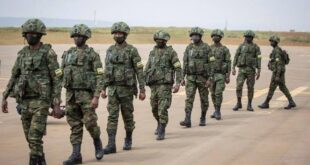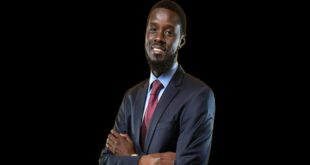Unearthing an alleged shadowy network of spies and their efforts to silence dissent.
Exclusive by political reporter Amy Greenbank
There was little fanfare when Rwanda’s Foreign Minister touched down in Australia in the final days of May.
Two weeks earlier his country had been thrust into international headlines amid revelations an asylum seeker swap with the United States sent a pair of alleged murderers to Queensland.
What exactly the Foreign Minister, Richard Sezibera, was doing in Australia remains in contention, but it clearly wasn’t a trip to Canberra to pass on well wishes to a re-elected Coalition Government, which had dealt with the scandal en route to its re-election.
His trip generated disquiet in the refugee community which led to the ABC uncovering allegations of a complex web of Rwandan spies living within the suburbs, creating a culture of fear among the refugees who had escaped that nation in pursuit of a safer life.

Kalisa Mubarak sits in the driver’s seat of his car in Queensland, regularly checking his rear-view mirror.
It’s a move police taught him to avoid being followed.
“The officer said if I think I’m being targeted to slow down to 40 in a 60 zone and see if the car passes,” Mubarak says.
“If it doesn’t, he told me to try driving a different route, and if that doesn’t work to call triple zero.”
Avoiding people appears unnatural for an otherwise talkative Mubarak. Yet having to flee is something that has dominated his adult life.
Mubarak left his home country Rwanda fearing for his safety. He went to South Africa but this, too, would prove temporary.
Mubarak claims the Rwandan Embassy in Johannesburg tried to recruit him as a spy, asking him to join a broader network in Europe tasked with tracking down opponents of the Rwandan regime.
But after discovering a government plot to assassinate his friend, he rejected the offer, turned state’s witness and testified against Rwanda’s authorities.
His evidence led to the conviction of four men.
A stint in witness protection would come next before he ultimately moved to Brisbane with his wife and children in 2012.
Landing in Queensland, the sunshine state, he had hoped he’d finally feel safe. But an anonymous text from an international number would dash those hopes.
“We are after you… you will find yourself lying down in a pool of your own blood,” the text read.
“If we can’t find you, we’re going to find your wife or your kids.”
He quickly changed his number, but a chilling warning from the police left him fearing he’d have to take further steps to protect his family. He says police told him Rwandan operatives lived in Logan in Brisbane’s south and urged him to stay clear of the area.
A Queensland Police spokesperson confirmed officers had looked into Rwandan interference in Australia in the past but couldn’t provide any details.
Mubarak says having survived speaking out against the regime once before, he’s now confident to share more widely what he knows about Rwanda’s global intelligence network.
Spies, he claims, are run out of the nation’s High Commission in Singapore because Kigali doesn’t have an embassy in Australia. Agents are sent where there is a significant refugee population — Brisbane, Sydney and Perth.
“We’re living in fear,” Mubarak says.
He claims some work in Australian Government agencies and refugee service groups, where they can access personal information. He offers a secret recording he made on the Gold Coast last year as proof.
Mubarak alleges the tape captures a conversation with a spy who is expressing frustration at another agent for bypassing the High Commission in Singapore and sending information to the Rwandan Government in Kigali.
“Normally when there is an embassy, the ambassador is in charge of the secret agents,” the man says on the tape. “But he doesn’t call here, he calls Kigali, and Kigali calls the Embassy, so then the Embassy is wondering, what’s the use of having us?”
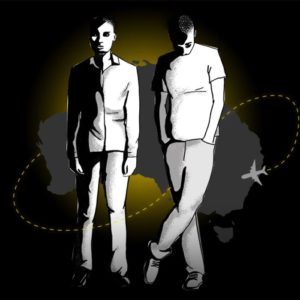
The African nation was shoved into the spotlight both here and in the United States in the dying days of May’s federal election.
The US news outlet Politico had revealed two men accused of killing tourists had been secretly brought to Australia under an asylum seeker exchange deal.
Gregoire Nyaminani, 49, and Leonidas Bimenyimana, 51, had been quietly living in south-east Queensland.
What came next, though, was largely overlooked.
Within weeks, the Rwandan Foreign Minister had touched down on the Gold Coast — the first high-profile Rwandan government minister to visit Australia in years.
Sezibera gave a speech at a leadership forum, but some within the Rwandan community questioned the timing.
His visit has sparked concerns with at least half a dozen refugees, who fear the official came to Australia to ensure the men remained silent about their experiences.
Speculation among those the ABC spoke with is rife that the former prisoners hold sensitive information that could discredit the Rwandan Government.
All asked not to be identified out of fear it would put their relatives in the east African country in danger.
Federal Minister Stuart Robert met Sezibera during his trip but declined to answer whether the two men were discussed.
Sezibera also did not respond to questions about his trip.
Silencing dissent from afar
Expat and refugee Rwandans say silencing critics and suppressing support for opposition parties in exile are among the top priorities of the Rwandan Government.
Some spies, Mubarak says, are planted in Australia as students because visas are easier to obtain.
Others, he says, are furnished with documents to help them build a case for asylum, then start working for the regime when they get permanent residency.
He alleges even more are recruited when they arrive as genuine refugees, having been threatened, blackmailed or coerced to become part of the intelligence network.
Sources have told the ABC that spying for the Rwandan Government allows people the ability to travel back to the country freely to visit relatives, and assurances financial assets won’t be seized.
Once they agree, they are urged to swear allegiance to the ruling party — the RPF — and follow any directive of the foreign government, Mubarak claims.
The ABC has obtained footage of one man who came to Australia as a refugee, pledging allegiance to the country he once fled.
Holding his right arm up, the chairman of the Rwandan Diaspora of Australia delivers an oath inside Rwanda’s High Commission in Singapore in 2017.
“I, Emmanuel Karekezi, do solemnly swear to the republic of Rwanda that I will never betray the Rwandan republic and I will honour and observe the constitution and other laws,” he says on camera.
“In case I don’t honour this call, may I be punished by law. God help me.”
The ABC has been told Karekezi received asylum status on the basis he was fleeing political persecution in 2004.
Karekezi confirmed he was now an avid supporter of the country’s governing party, which has been in power since 2000.
He conceded he was granted a humanitarian visa but denied being recruited to report back to the foreign government. But he acknowledges being aligned with the Government allows him to return to Rwanda freely.
“We all have families we want to see back home.”
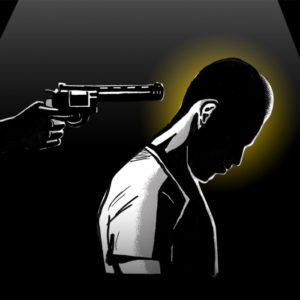
Relief short-lived
Gaining refugee status often brings with it a relief for those fleeing persecution.
But it’s an experience that some Rwandans struggle with as they build new lives on the other side of the globe.
Refugees the ABC have spoken with claim to have been threatened by various people with links to the Rwandan Government after speaking out against the east African nation.
It’s a concern that’s reached the top levels of the Australian Government.
Government advisor on African-Australian relations, Dr Nadine Shema says she warned the Department of Foreign Affairs and Trade about the escalating problems with intimidation.
One man from WA, who identifies as a political activist, claims police told him his life was in danger in 2013 and 2017.
“They came to my home and told me to move to a different suburb and install security cameras, so I did,” he says.
WA police did not respond to questions.
Rwandan-born Associate Professor Theo Niyonsenga, from the University of Canberra, says the Australian public don’t realise the extent of the threat.
“The Rwandan Government would have no qualms eliminating people if they thought they have sensitive information,” he says.
The ABC has obtained information that shows just how high within the Federal Government the concerns have reached.
Last year, allegations against Rwanda’s High Commissioner to Singapore Guillaume Kavaruganda were raised with then foreign minister Julie Bishop.
Kavaruganda lists Australia and New Zealand as among his diplomatic responsibilities while serving in Singapore.
Documents that ABC has witnessed state the High Commissioner allegedly threatened to kill a Rwandan-born NSW man.
The human rights activist spoke to the ABC under the condition of anonymity.
He says the High Commissioner delivered the warning to his sister following a community event in 2017 and urged her to pass it on.
“The Rwandan Government is very strong, and all people who dare oppose it will die in vain, and this is what is going to happen to him,” he alleges Kavaruganda said.
“There is a gun pointed at him and he better be careful.”
His sister was so scared she recorded the conversation and gave it to police, but they were unable to help.
“The Ambassador has diplomatic immunity in Australia,” a police statement read.
“We are prevented from pursuing an investigation and ultimately a prosecution of him.”
A police source close to the investigation says he had no reason to doubt the man’s account.
The refugee alerted his local MP, who elevated the matter to Bishop, who raised it through diplomatic channels.
“The Australian Government takes seriously any threats made by a foreign official towards an Australian citizen,” she said in a statement.
Kavaruganda declined to comment on the allegations.
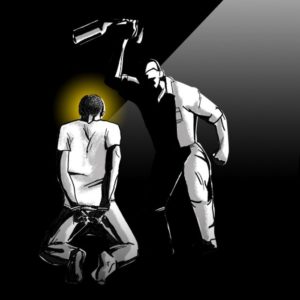
Secret deal makes global headlines
When news broke about a secret deal to bring accused murderers to Australia, the focus was largely on the politicians who struck the deal to bring them here.
The crimes they were accused of committing were well covered, but less was revealed about the circumstances involved in them facing justice.
The men — Nyaminani and Bimenyimana — claim the Rwandan Government set them up.
They faced trial in the US along with a third man, charged with the murder of Western tourists in Uganda in 1999.
The case was thrown out in 2006 after a judge ruled the confessions had been coerced through torture.
Bimenyimana testified he had been repeatedly bashed with a “brick in a sock” until he confessed.
Nyaminani claimed a 30kg log was placed on his shoulders, with a smaller one secured behind his knees to ensure they were slightly bent.
The torture, he said, was so painful he thought “my nerves and my muscles were going to erupt”.
The court also heard the men had likely been shackled wrist to opposite ankle for long periods of time.
Medical experts for both the defence and prosecution conceded their scars matched their stories.
The three men were united in claiming Rwandan Government officials told them what to write in their confessions.
Court documents also show investigators took a DNA sample of Nyaminani but were never able to find a match with any of the victims.
An immigration judge denied them asylum in the US, ruling they posed a danger to society as they had been soldiers in a Hutu rebel outfit that was considered a terror group.
They languished in US detention for the next 15 years until coming to Australia, a move Prime Minister Scott Morrison insisted only happened after the men cleared rigorous security tests.
A non-government organisation moves them around every few months to avoid the media finding out where they live.
The men live in south-east Queensland but the ABC has decided against publishing the location.
A community elder the ABC spoke with says the men are “scared the community thinks they’re killers” despite the charges being dropped.
Others in Queensland’s largest refugee groups think the men are “probably innocent”, says Rwandan Association president Amiel Nubaha.
The scepticism about the men’s guilt stems from their experiences with Rwanda’s criminal justice system.
“There are hundreds of cases in Rwanda where people are forced to apologise for things they didn’t do,” Nubaha says.
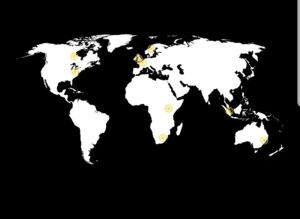
International concerns about Rwanda
Rwandan President Paul Kagame is credited with establishing peace after the genocide.
But now, after 19 years in office, a growing number of Rwandans are worried about his determination to hang on to power.
They’re not alone.
Human Rights Watch central Africa director Lewis Mudge works from New York, after being expelled from Rwanda four years ago.
He was the last advocate to have a permanent presence there.
“I’ve heard a lot about these spy networks in the United States, Canada and Europe. I haven’t heard of them in Australia but I wouldn’t be surprised,” he says.
While it’s common practice for countries to post spies to their embassies, he accuses Rwanda of violating diplomacy by using officials to threaten and attack refugees living in exile.
He has documented dozens of cases around the world.
“It’s usually the second in command in the embassy or high commission that runs the informers, but the ambassador or high commissioner would absolutely have to be aware,” he says.
In 2011, UK Police warned two Rwandan refugees in London that their lives were at risk, with the suspect later linked to the country’s embassy in Belgium, he says.
“Diplomatic norms are tossed out the window by the RPF when they’re trying to track down their own people,” Mudge says.
“They make gains when these killings are pulled off because it demonstrates the reach of RPF beyond borders and has a chilling effect.”
Mudge is far from flattering when he speaks of the opposition party in exile, the Rwandan National Congress.
“[They] aren’t exactly angels either…as one of their key leaders has been accused of war crimes.”
Though his biggest criticism is for the current regime for what he says is its “flagrantly flouting international law and norms”.
He points to a 2015 US Congress hearing into Rwanda that found:
“In recent years there have been credible reports that the RPF Government has commissioned assassins to kill dissidents living in exile who criticise the Government or attempt to form political associations or parties.”
A landmark case in South Africa in 2010 was the first time Rwanda was implicated in an assassination attempt by an international court.
Brisbane man Kalisa Mubarak was the crown witness.
Four men were convicted of attempting to shoot former military chief Kayumba Nyamwasa in South Africa.
Several years later, another exile — former army major Robert Higiro — told the US Congress he was offered $US1 million to hire contract killers to take out Nyamwasa and another man, Patrick Karegaya.
He says the offer came from a trusted ally of the President, Kagame.
Higiro refused and decided to testify after Karegaya turned up dead.
He’d been strangled in a Johannesburg hotel room, with reports a bloodied towel and curtain cord were found stuffed into the room’s safe.
Kagame denied any involvement.
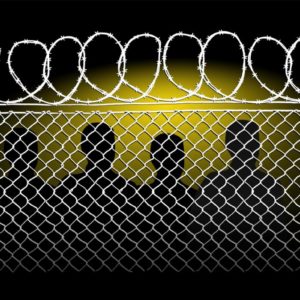
“There are plenty of countries that do this, Rwanda isn’t even halfway up the list,” says Professor Greg Barton from Deakin University.
He thinks most Australians have no idea how foreign intelligence really works.
“It’s not the Hollywood version, it’s the gritty stuff… there is a whole world of intense activity,” Barton says.
He says smaller authoritarian regimes throw resources at hunting down political dissidents, to ensure others don’t follow their lead.
“If you’re a high-value target, like an active member of an opposition party, you’re in danger.”
“Those that are living in exile today might not always be, and if they return to Rwanda they will often be educated, wealthier and could be looking to play a role in politics.
“In countries where coups are possible, of course leaders worry about that.”
Assassination attempts are often made to look like accidents, Barton suggests.
“Nerve agent attacks are rare unless to send a message. It’s more likely they will be run off the road or fall off a balcony.
“You might hear the news that someone has died in a car accident, but no-one really knows what happened.”
https://mobile.abc.net.au/news/2019-08-25/spies-in-our-suburbs-alleged-spy-web-silencing-rwandan-refugees/11317704?pfmredir=sm
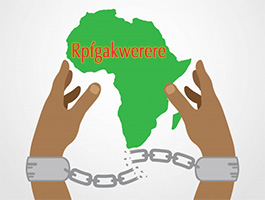 Africa Just another WordPress site
Africa Just another WordPress site
